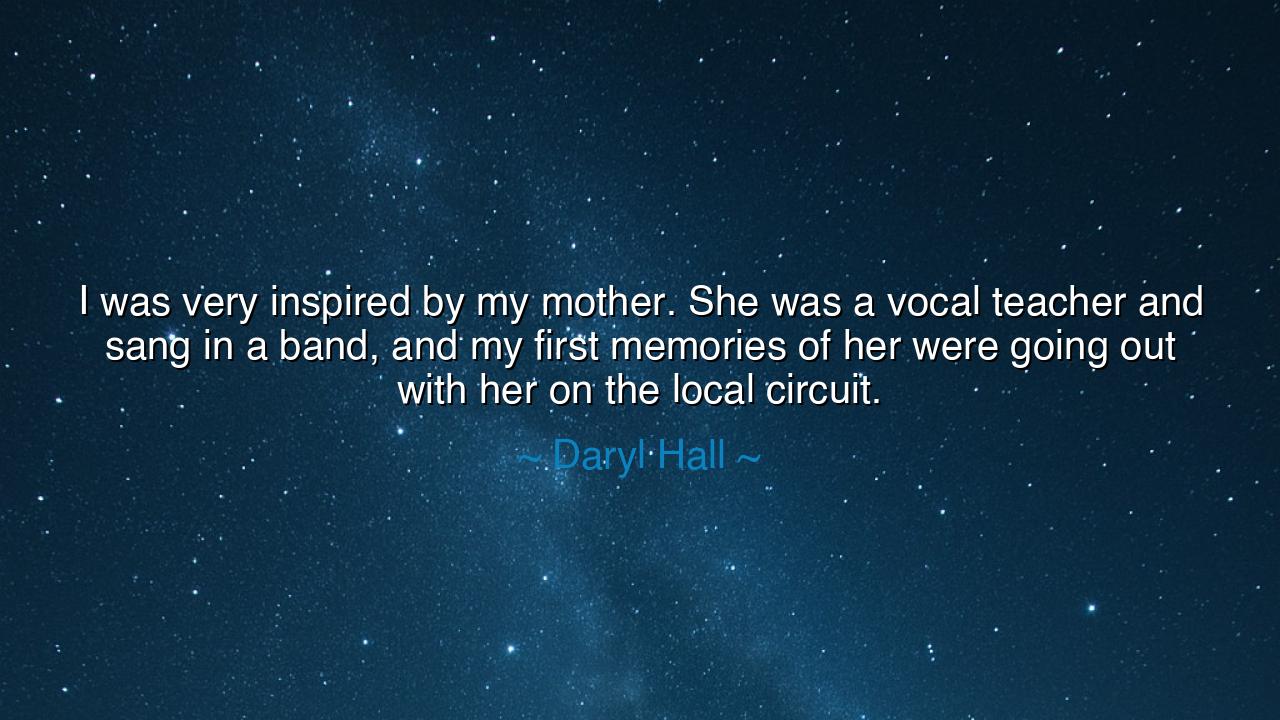
I was very inspired by my mother. She was a vocal teacher and
I was very inspired by my mother. She was a vocal teacher and sang in a band, and my first memories of her were going out with her on the local circuit.






Hear the words of Daryl Hall, who spoke of the roots of his own song: “I was very inspired by my mother. She was a vocal teacher and sang in a band, and my first memories of her were going out with her on the local circuit.” In this remembrance, he honors not only a parent, but the eternal truth that greatness is often seeded in the soil of family, nourished by example and lived experience. Inspiration is not born in isolation, but in the sparks we witness in those who walk before us. His mother, both teacher and performer, became the living model of the path he would one day follow.
To call her a vocal teacher is to highlight the sacred role of one who not only possessed talent but also chose to share it. A teacher multiplies their gift, planting it in others. To call her a singer in a band is to show that she lived her art, not as a hidden thing, but as a light upon the stage. Thus, Hall’s earliest memories were not of abstract lessons, but of life lived in music—voices rising in harmony, instruments beating with rhythm, audiences carried by song. From this fusion of discipline and performance, the child’s imagination was set aflame.
This pattern is woven through history. Consider Johann Sebastian Bach, whose family was filled with musicians. His father taught him the violin, his brother showed him the harpsichord, and from this living stream of sound, Bach drew the foundations of genius. Just as Daryl Hall followed his mother to the local circuit, Bach followed his kin into the chambers and choirs of Europe, carrying forward a legacy that began at home. In both stories, we see the power of example: when art is lived openly, it becomes an inheritance more valuable than gold.
There is also a lesson of courage here. To sing in a band on the local circuit is not the grandeur of royal courts or great theaters, but it is real, it is alive, it is the heartbeat of community. Hall’s mother showed him that art need not wait for the distant stage—it begins where one is, in small halls, in gatherings, in the intimacy of people connected by music. By witnessing her dedication, he learned that music was not a dream to be admired from afar, but a life to be lived step by step, gig by gig, song by song.
The deeper meaning of Hall’s words is that inspiration flows most powerfully when it is embodied. Children do not remember lectures as much as they remember lived moments—the warmth of a voice, the sight of courage, the rhythm of dedication. A mother who both teaches and performs gives a child not only instruction but vision: “This is what it looks like to live in harmony with your gift.” Hall’s career, which would one day span the world, had its root in those earliest memories of walking beside his mother as she walked in her own calling.
The lesson for us is this: never underestimate the influence of the life you live before others. Parents, mentors, and guides—your example plants seeds, often when you do not know it. If you live your craft with integrity, if you share your gift with others, you awaken possibilities in those who watch you. And for those who seek their path, look to your beginnings, to the examples that stirred you. There you may find the compass pointing to your true north.
So I say to you: remember Daryl Hall’s tribute to his mother. “I was very inspired by my mother.” Let it remind you that inspiration is both given and received. Live so that your actions might light the fire in another. And if you have received such inspiration, honor it—not only with gratitude, but by carrying it forward. For the legacy of a teacher, a singer, a parent, is not only in their own art, but in the generations who rise to sing after them.






AAdministratorAdministrator
Welcome, honored guests. Please leave a comment, we will respond soon